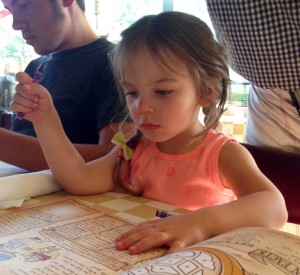The sunset fell across the courtyard at King’s Fish House last night in a way that glittered through a bottle of Chardonnay and made a big ruby jewel out of Mary’s wine glass. My granddaughter, Willy, one hand palm-flat to her cartoon canvas and the other holding a trident bundle of crayons, appeared to ponder where she would strike with her colors. It was her father Eric’s birthday; he was tired, from work, and he was considering his Scotch. The rest of our children were lining the long table — a party of 13, with spouses and friends.
Someone ordered “Fanny Bay Oysters.” A pair of leggy women in tight jeans and high heels took their seat across the restaurant. They weren’t cheap, but they were flashy, the sort that make a table of men look sidelong at each other, as though to acknowledge the mascara and bosomy silk that had just entered the room. The air of the courtyard was perfect, battered with butter and frying salmon. I loved the shadows of the bistro baroque around me — green filigreed iron posts, checkered table clothes, brick beneath our feet, bread on the table, vintage 1920 poster art on the walls.
Heaven will be something like a restaurant, I’m hoping.

My children had taken up a Facebook argument about young marriage. I could hear gentle scolding about motives in the distance. Mary would reach over and hold my hand. Willy began to color, furiously. The wine arrived. I settled on my portion of lobster, and I tried to recognize what I was feeling.
I didn’t say the words, but I thought them. “642 Saltair.” That’s where Mary and I met for the first time, in Brentwood, at a friend’s party. Whenever Mary and I find ourselves pondering family, the big, boisterous family we’ve been given, one of us, usually me, mentions that address, “642 Saltair.” We’re asking ourselves, in this, whether we could have ever imagined, then, the panoply of stories we would create by joining our own two small lives?
Somewhere, down at the end of the table, Lockton is chuckling at something Nicholas said. My four sons are laughing with, and at, each other. At the other end of the table, seven month old Margot stirs from her slumber and she’s passed across the bread tray, and into the arms of her yiayia, (Mary). I chat with my son in law about our little experiment with a barley crop on the farm. We discuss how to direct “The Life of Riley,” our new, sitcom sizzle-pilot. Lizzy wonders outloud, in my direction, whether she can go dancing tomorrow night. We kid Eric about sitting with the old people.
And when you pass that half century mark, you look around the table, and you see so many souls traveling through life, on their own sovereign journeys, all because a woman once looked across the room and smiled at you. We were just two strangers, and then we became an idea, and then a couple, and then a family, and then a village. I could be sitting in this restaurant all by myself, but I’m not. I’m surrounded on all sides.
 We live, however, in a strange age of child rationing; romance doesn’t lead to families, necessarily, anymore. The bosom beauties across the restaurant can be enjoyed and can enjoy their conquests, sexually, without the consequences of children. This freedom has become something of a fiery anthem in postmodern life. Children “screw up” your life. They are not a blessing, but an extraordinary “responsibility.” Some policy wonks think you should even be licensed before you have them. Wait till you’re thirty five, until you can honestly affirm you are ready to deliver this generation’s version of the childhood that every child deserves.
We live, however, in a strange age of child rationing; romance doesn’t lead to families, necessarily, anymore. The bosom beauties across the restaurant can be enjoyed and can enjoy their conquests, sexually, without the consequences of children. This freedom has become something of a fiery anthem in postmodern life. Children “screw up” your life. They are not a blessing, but an extraordinary “responsibility.” Some policy wonks think you should even be licensed before you have them. Wait till you’re thirty five, until you can honestly affirm you are ready to deliver this generation’s version of the childhood that every child deserves.
Poppycock. Find a good woman. Marry her. Make fantastic love. Raise children. The dinner conversation at the restaurant will be a lot more interesting.
And that feeling I couldn’t describe earlier? That lump in my throat as I listen to my children’s conversation? I know what it is.
Contentment.